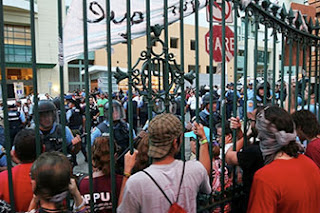 |
| image source |
Maritza Stanchich
Huffington Post
Coincident with massive, at times explosive, student protests in Rome and London, University of Puerto Rico has again become a flashpoint with a student strike beginning Tuesday that turned the main campus into a militarized zone of police, riot squads, and SWAT teams, complete with low-flying helicopters and snipers. What began as a conflict over a steep student fee hike is now seen as a larger struggle to preserve public education against privatization.
Resistance to the imposed $800 student fee has triggered repressive state measures: police have occupied the main campus for the first time in 31 years and Monday the local Supreme Court, recently stacked by the pro-Statehood political party in power, outlawed student strikes and campus protests. More than 500 students defied the ruling by demonstrating on campus Tuesday, brandishing the slogan “They fear us because we don’t fear them” (“Nos tienen miedo porque no tenemos miedo”). This current strike revisits accords to negotiate the $800 fee, which in June ended a two-month shut down of 10 of 11 UPR campuses, as UPR faces a $240 million budget shortfall precipitated by the state not honoring its own debt to the institution.
Civil rights groups have declared a state of high alert in the wake of disturbances last week and statements by leading public officials seen as creating a hostile climate that inhibits free speech rights. In response, about 15,000 UPR supporters marched on Sunday from San Juan’s Capitol building to La Fortaleza governor’s mansion, under a balmy bright blue tropical sky in this U.S. Territory of about four million U.S citizens, though little known to most Americans beyond being a tourist destination.
In the standoff leading up to this week, top university officials have repeatedly threatened that a strike may prompt them to shut down the main campus at Río Piedras, which serves 20,000 plus students, employs about 1,200 professors and 5,000 non-teaching staff, and hosts millions in scientific research funding (system-wide the UPR serves about 65,000 students). In addition, 10 of 11 University of Puerto Rico campuses remain on probation by its accrediting agency, The Middle States Association, in the areas of long-term fiscal viability and effective administrative governance, of which the current student mobilization is a symptom, not a cause.
Tensions mounted last week leading up to a two-day student walkout when Capitol Security, a private security firm contracted by the university for $1.5 million, demolished entrance gates to the campus. Hired guards were young with little or no training or evaluation, bore no identification badges and some were armed with sticks and pipes in a climate of intimidation perhaps not seen since dockworkers strikes of the 1940s. Many of the guards had been recruited from marginalized Afro-Puerto Rican communities, such as Villa Cañona in Loíza, which has been the site of documented police abuses, lending a disturbing dimension of institutionalized racism, according to community leaders there.
Several violent incidents were reported, including a student who was seriously beaten and injured by guards. One video purportedly of students breaking security van windows was repeatedly aired in the local media as the justification for the police occupation of the campus, just as students had peacefully concluded the two-day walkout last Wednesday evening.
“UPR has a long history of infiltrators and saboteurs involved to instigate such incidents,” said William Ramírez, Executive Director of the Puerto Rico chapter of the American Civil Liberties Union. The purported incident capped off a series of provocations. Gov. Luis Fortuño in a televised appearance openly declared that leftists would no longer be tolerated on the campus. His Chief of Staff Marcos Rodríguez Ema publicly taunted that students and professors who dare protest will get their asses kicked out (“vamos a sacarlos a patadas”).
The university administration has also designated areas limiting protests to outside the campus, and on Monday Chancellor Ana Guadalupe formally prohibited all protests or group activities of any type on the campus through January 15. The chancellor also issued an edict this week requiring all students to carry their student identification cards at all times.

Be the first to comment on "Puerto Rico Student Strike Intensifies, Public Education and Civil Rights at Stake"